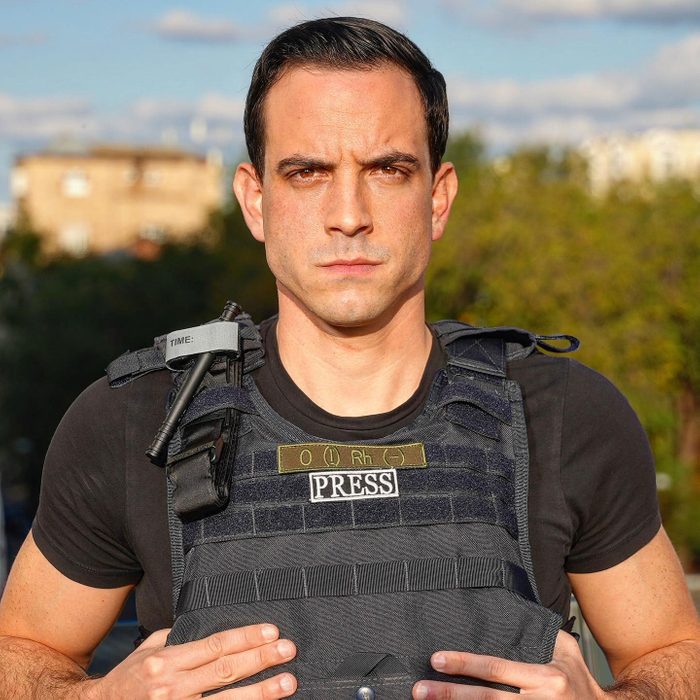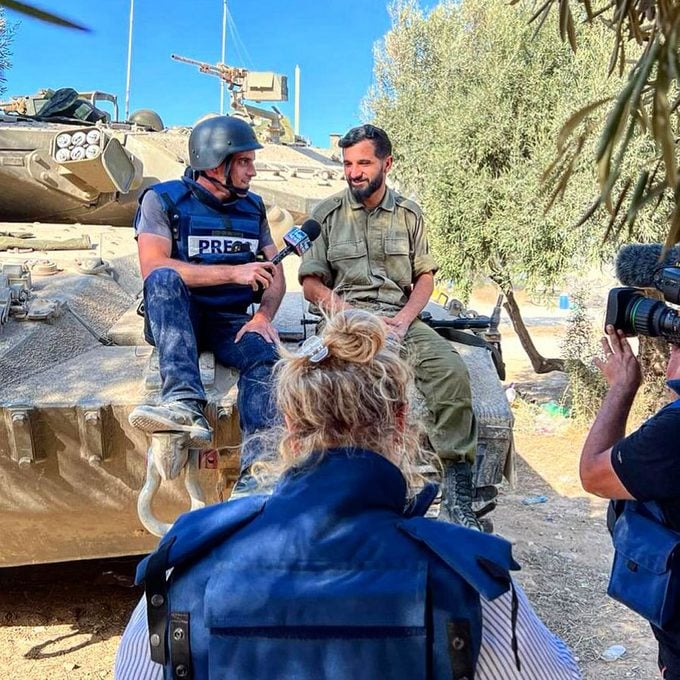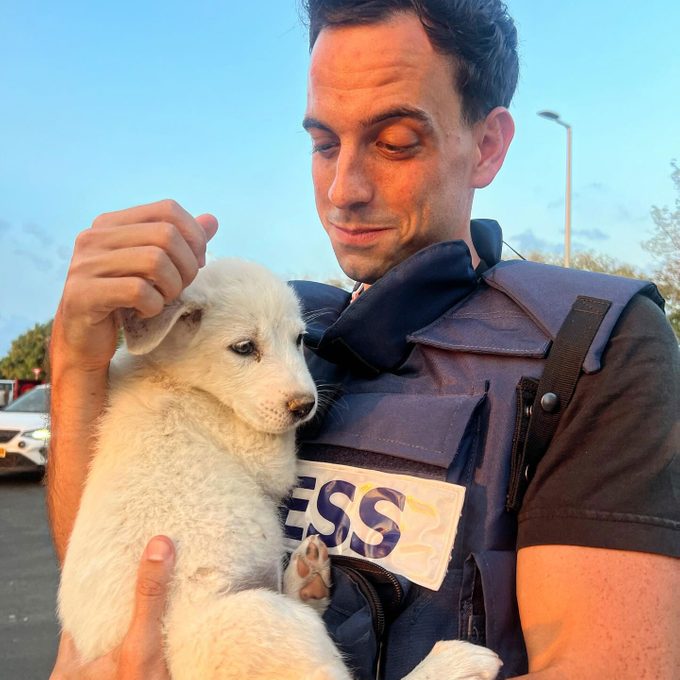TV War Reporter Trey Yingst Reveals What It’s Like to Cover Conflict on the Ground: “I’ll Process This When I Have Time”
Updated: Nov. 01, 2023

The 30-year-old FOX News correspondent opens up about the rarely discussed mental health experience of reporting from the field.
Since he joined FOX News Channel in 2018, Trey Yingst has been a fresh face—and a relatively down-the-middle voice—as a foreign correspondent for the cable news network. Based in Jerusalem for the past five years, Yingst is among the youngest journalists in the field and in his early career has led live on-the-ground coverage from some of the most noted conflicts in modern history, including Russia’s invasion of Ukraine, the 2021 withdrawal of U.S. troops from Afghanistan (while gaining exclusive access inside a Taliban prison and interviewing the leader of a terrorist organization), and currently, the Israel-Hamas conflict from the Gaza Strip. Yingst also gained behind-the-scenes access to the Coronavirus Critical Care Unit inside Tel Aviv’s Sheba Medical Center during the COVID-19 pandemic.
Lauded for reporting around the clock (Yingst “has not been getting much sleep these days,” an in-house representative for FOX news told us this week), Trey Yingst also happens to be a passionate advocate for mental health.
Friday night between reports from Israel, Yingst spoke with our team at The Healthy @Reader’s Digest about the steps he takes to care for himself in high-stress, high-pressure scenarios.

The Healthy @Reader’s Digest: You’re based in Israel, but you had a very American upbringing. How did your career take you to the Middle East?
Trey Yingst: So this was my first assignment for FOX, to be based out of our Jerusalem bureau. So I moved to the Middle East five years ago and it’s been an incredible opportunity, but also a chance to see the world and tell stories of people all over. Since I’ve been at FOX, I’ve covered stories in Afghanistan and Iraq and Lebanon and Gaza, all over the region in Pakistan.
The Healthy: What were you doing when Hamas militants began their attacks early on Saturday, October 7?
Trey Yingst: My producer called me very early in the morning around 7 a.m., and so I knew it must be breaking news because she doesn’t call unless there is something very significant happening. And we didn’t have a lot of information at that time. We just knew an incident had happened in the south and there was rocket fire. We were one of the first teams in the south, but we were certainly the first international team to make it to the south. I have a flak jacket at home and a vest, so I just put my vest on. We’re trained to cover these events, so I can recognize when something significant is happening. I drove south and it immediately was an apocalyptic scene. We stayed at this evacuation point and we watched as soldiers and civilians came there … It was a triage scene.
The Healthy: Correspondents always seem to appear so stoic and professional in these situations. Can you talk about how it really affects your mental health?
Trey Yingst: I am a big advocate for mental health awareness. I spent more than 185 days in Ukraine since that war erupted. We saw quite a lot there. And so I started talking about this more publicly then. Every day I [usually] do cold plunges. There’s a place in Tel Aviv that I go, and that has been incredibly helpful just to start my day off on the right foot. I go to the gym, I do meditation … I have mantras my therapist and I discuss, I say three words: Focus, discipline, and momentum.
[But] this has been so chaotic … When I have time in the mornings, I will turn the shower in the hotel as cold as it can go and try to do my own cold exposure. And then last night, my producer and I went to this pharmacy we found that was open and we got skincare masks. Something that makes me feel good is when I have clean skin. And so I did a mask last night and just for 15 minutes, it felt I was relaxed for the first time in two weeks. And so that was nice. Just a break from all the chaos.
I will work through with my therapist to address the things that I’ve seen when I have time. I’ll get back in my routine of taking cold plunges. I’ll process this when I have time, but I don’t have time right now. We’ve witnessed horrific scenes. … We are witnessing history, but this war is incredibly graphic. But we have a job to do to make sure that we have an accurate depiction of history.
The Healthy: As we witness the images on social media, on the news, people talk about deleting some apps to give themselves a mental health break. You don’t have that luxury.
Trey Yingst: I want to convey the emotion of this because I want people to care about this story. It’s critically important that people care. But I also want people to understand these are difficult things. The reality of war is sometimes difficult to consume. I would just recommend to people the same mental health things that I’m talking about, they should do them for themselves. I would tell them to be mindful of their own mental health. Be aware and take breaks and talk to people and have these conversations.

The Healthy: Your coworker mentioned that you aren’t getting much sleep, which is understandable. Sleep is so important to health, both physically and mentally. How does anyone manage high emotions when they’re going on such little sleep?
Trey Yingst: We’re not only sleep-deprived, we are under incredible pressure. I would say the first few days of this war, I didn’t sleep really at all. A few hours when I could here and there, but it was really, really intense, just nonstop around-the-clock coverage. It was the exact same feeling when the Russians invaded Ukraine and we were reporting around the clock, and it was the same feeling when we were in Afghanistan after the Taliban takeover. So this is actually part of the story I think that’s important to tell. I work really hard on mental and physical health during times of peace so that I am prepared for times of war. When I’m in the gym, when I’m in these cold baths, I’m thinking about moments like this and I’m thinking to myself, There’s going to be a time when I need to be mentally and physically strong. That time is here.
Get The Healthy @Reader’s Digest newsletter and follow The Healthy on Facebook and Instagram. Keep reading:
- A Trauma Recovery Expert Lists 6 Gentle Ways To Protect Your Psyche When the Headlines Hurt
- These Are the Top 4 Vitamins Doctors Take So They Don’t Get Sick During Virus Season
- This Is the Healthiest Vegetable, According to a Decade of Research
- Ice-T Opens Up About His Health, the Drink He Gave Up for Good, and His Unexpected Deal with Dr. Dre


















